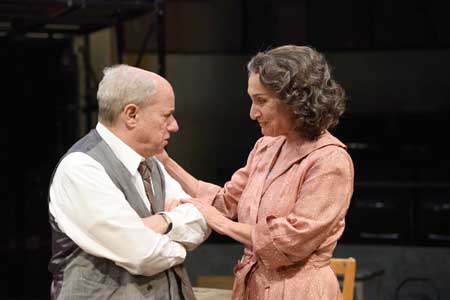Play (1949)
by Arthur Miller
Directed by Brian McEleney
Featuring Stephen Berenson as Willy Loman
Trinity Repertory Company
Providence, RI
September 28 – November 26, 2017
With Stephen Berenson (Willy Loman), Phyllis Kay (Linda), Matt Lytle (Biff), Billy Hutto (Happy), Fred Sullivan, Jr. (Charley), Mauro Hantman (Howard/Ben), Shenyse Harris (Miss Forsythe), Tyler Herman (Bernard), Will Adams (Stanley), Rachel Dulude (The Woman)

Phyllis Kay as Linda
in “Death of a Salesman”
Photo: Mark Turek
Courtesy of Trinity Repertory Company
Poor Willy Loman (Stephen Berenson) can’t let go of his pipe-dreams – that his grown sons, Biff (Matt Lytle) and Happy (Billy Hutto), will be successful businessmen or that even he will be able to have a small degree of security in his old age. He butts up against one hope after another and finds his world crashing around him. His wife, Linda (Phyllis Kay), does her best to keep him afloat.
There’s a beautiful line towards the end of this modern tragedy in which Linda is referring to Willy and says that he’s just a small boat looking for a safe harbor. It’s a poignant and sweet image and so totally in contrast to the image that Willy keeps conjuring up for himself. Bloated with a sense of what it means to go out and be liked, so important to a salesman and in business generally, he can’t seem to acknowledge his own smallness and down-to-earthness. He puts this over on his two thirty-something sons, most forcefully on Biff, the older of the two, once a football hero and now an almost middle-aged failure.
But Biff has the sense that the world he should be in is different from the one that Willy envisions for him. Wanting to work outside and with his hands he can’t quite get it across to his father that he’ll never be the big businessman Willy wants him to be. One or another disappointment, in school, or in work afterwards, follow Biff. Willy insulates himself constantly against the notion that Biff, or his other son, Happy, will be anything but businessmen, and it spells his own ruin.
Linda is there to prop Willy up, to cheer him along, and to convince their sons that Willy needs attention and TLC, despite all of his neurotic insistence on their being big shots.
In some productions of Death of a Salesman, Biff is portrayed as a kind of lummox, an aging jock who really doesn’t have the talent to do what Willy wants him to do. Not so here. Matt Lytle’s intelligent and earnest portrayal of Biff is exactly the opposite – of a guy really trying to come to terms with his own sensibilities and to confront the awareness of that with the image his father has of him. The scene near the end of the play in which Biff embraces his father and breaks down is truly heartbreaking, a powerful theatrical moment, and Lytle plays it with courage, force and conviction. His Biff is emotionally complex, but also vividly sincere and thoughtful. It’s a potent interpretation of the role.
Phyllis Kay’s Linda has a penetrating warmth that radiates throughout, a solid anchor for Willy growing adriftness. The naturalness with which Kay conveys that sensibility lends a grace and radiance to this part which has greater challenges and subtleties than one might think.
As Willy, Stephen Berenson conveys exactly the sort of features that Miller describes, a small, retiring guy, in distinction from the famous portrayal given by Lee J. Cobb in the celebrated 1966 CBS television version, or in 1999 on Broadway by Brian Dennehy, both sizeable men. Berenson’s aptly compressed demeanor is much more like that of Dustin Hoffman who portrayed Willy in a 1985 film version. He manages to capture that possessed vaingloriousness that packs itself into that retiring frame, made smaller and more stooped by age.
When, in the penultimate scene, Biff embraces Willy with a kind of tragic desperation, Willy retreats with a wonderful rendition of the Biff really loves me line. Berenson does it beautifully, projecting and enhancing the power of the previous interaction between father and son.
The result is a dutiful and persuasive account, with some exceptional performances along the way.
– BADMan
Leave a Reply